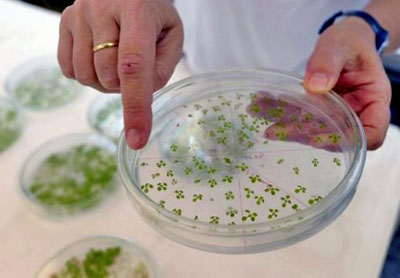|

January 14, 2013
from
PHYS Website

Enlarge Genetically
modified test plants at a biotechnology lab
at Litoral University
in Santa Fe, Argentina, August 2012.
The EU's food safety agency challenged
its doubters on Monday, making available all the scientific
information used to clear a genetically modified corn which
a French researcher had linked to cancer.
The European Food Safety Authority (EFSA)
said that,
"given the level of public
interest... (it would) make all data on genetically modified
(GM) maize NK603 publicly available on its website."
While EFSA had previously provided such
information on request,
"any member of the public or
scientific community will now be able to examine and utilize the
full data sets used in this risk assessment," it said in a
statement.
EFSA, which reviews the use and
authorization of such crops and foodstuffs, in November rejected
outright a report by Gilles-Eric SÚralini of the University
of Caen which had linked NK603 to cancer found in laboratory rats.
It said at the time that SÚralini's work
failed to meet "acceptable scientific standards" and accordingly it
had no reason to review its assessment of NK603, made by US
agri-food giant Monsanto.
The EU also demanded that SÚralini
release more details of his work but he responded in kind, calling
on EFSA to open up its data first.
The EFSA said on Monday that the NK603
data was being made available (Rodent
Feeding Study With Glyphosate Formulations and GM Maize NK603
-
SÚralini et al. - 2012
Publication - Final review)
as part of an initiative to make its overall workings more
transparent.
"Risk assessment is an evolving
science and EFSA is always willing to review its past work
should new robust science bring a new perspective to any of the
(its) previous findings," EFSA Executive Director Catherine
Geslain-Laneelle said in a statement.
Monday's move,
"aims to make data used in risk
assessment publicly available," Geslain-Laneelle said, by
promoting research and working with scientists.
"This will make the conclusions of
risk assessments even stronger when ensuring public health
protection and further build confidence in EFSAs work."
Environmental groups have been very
critical of the EFSA, saying it was not doing enough on its own to
test GM foods and gave Monday's announcement a guarded welcome.
"This sounds like a positive
initiative to shine some light on the secretive world of EU GM
crop authorizations," said Greenpeace EU agriculture policy
director Marco Contiero.
"So far, EFSA has only published
information on one specific GM product. We expect that the same
level of transparency will apply to all GM products that have
been and will be submitted for EU approval," Contiero said in a
statement.
"Confidential business information
will continue to be kept secret, so it will be crucial to see
how wide a definition EFSA will choose to use."
|

